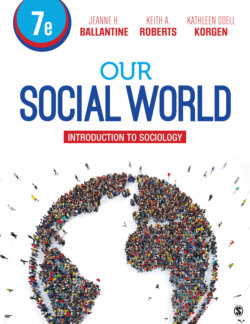Читать книгу Our Social World - Kathleen Odell Korgen - Страница 170
На сайте Литреса книга снята с продажи.
Socialization and Macro-Level Issues Sense of Self in a New Global Context
ОглавлениеImmigration patterns and ethnic conflicts around the world have resulted in a fairly new phenomenon: transnationalism. Transnationalism refers to multiple ties and interactions linking people and institutions across the borders of nation-states (UNESCO 2017). Many people crossing borders as immigrants, fleeing war and violence or seeking better economic opportunities, have multinational social relations that link together their original societies with their new locations. This means that an individual or a family has national loyalty to more than one country. Often, transnationalism occurs after the migration of war refugees, whose roots lie in their country of origin and whose close family members may continue to live far away. Recent transnational migrations due to wars include Somalis moving to Kenya’s Dadaab refugee camp, Rohingya fleeing Myanmar for refugee camps in Bangladesh, and Syrians who have fled to European and other Middle Eastern countries (Refugees Deeply 2018).
Consider the socialization process of transnational children raised in war-torn countries. In the Palestinian territories, especially Gaza, and in Israeli settlements along the border, children grow up with fear and hatred that result in major influences on their socialization. Some war refugees spend childhoods in refugee camps and may never return to their native countries. For people experiencing transnationalism, there are conflicting messages about culturally appropriate behaviors and the obligations of loyalty to family and nation. Events of a national or global nature directly impact how an individual is socialized—with some of the socializing influences being from outside one’s country of residence.
However, one need not migrate to another country to experience global pressures and added socialization influences. The Internet and smartphones have increasingly created connectedness to other parts of the world and an awareness of global interdependencies. Some commentators have even suggested that the Internet is a threat to the nation-state because it allows individuals to be socialized through friendships, loyalties, and norms that are not in the interests of the state (Drori 2006). Ideas of social justice or progress may be shaped not just by the government that rules the country but by international human rights organizations and ideas obtained from the Internet that cross borders. In recent uprisings in some Middle Eastern and North African countries, social networking kept movement participants in touch with others in the uprisings and with outside media and supporters. Socialization agents now include electronic communication beyond local and national boundaries, and provide information, contacts, and friendships across borders and boundaries. Figure 4.4 on Internet use around the world illustrates not only variability of access but also how widespread this access has become. One interesting question is how access or lack of access will influence the strength of “us” versus “them” feelings between citizens of different countries, insofar as sense of self is connected to belonging to a group—to a sense of we.
Description
▼ Figure 4.4 Internet Users per 100 People
Source: World Bank 2016.
At a time when people lived in isolated rural communities and did not interact with those unlike themselves, there was little price to pay for being bigoted or chauvinistic toward those who were different. However, we now live in a global village where we or our businesses will likely interact with all kinds of people in a competitive environment. If we hold people in low regard because they are unlike us or because we think they are destined for hell, there may be a high cost for this animosity. Therefore, training in cultural sensitivity toward those “others” has become an economic and a political issue in many communities.
The reality is that children today live in a globalized world. An increasing number of children around the world learn multiple languages to enhance their ability to communicate with others. Some college campuses require experiences abroad as part of the standard curriculum because faculty members and administrators feel that a global perspective is essential in our world today and part of a college education. Global sensitivity and tolerance of those once considered “the other” has become a core component of curricula today.
Sometimes, global events can cause a different turn—away from tolerance and toward defensive isolation. When 19 young men from Saudi Arabia and other Middle Eastern countries crashed planes into the World Trade Center in New York City and into the Pentagon in Washington, DC, the United States was shocked and became mobilized to defend itself and its borders. The messages within schools and from the government suddenly took a more patriotic turn. So this event and other terrorist acts, clearly tragedies rooted in global political conflicts, did intensify the boundaries between people and loyalty to the nation-state. Global forces are themselves complex and do not always result in more tolerance.
Indeed, the only thing we can predict with considerable certainty is that in this age of sharing a small planet, the socialization of our citizens will be influenced by events at the macro level, whether national or global.
Thinking Sociologically
How can events at the macro level (national or global) influence our individual socialization experience at the micro level? Consider world events such as wars and trade conflicts, education, religion, and other world events that affect most global citizens.
